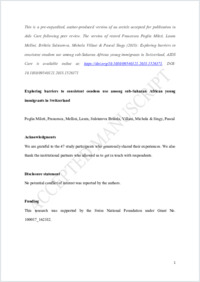Exploring barriers to consistent condom use among sub-Saharan African young immigrants in Switzerland
- Poglia Mileti, Francesca Department of Social Sciences, University of Fribourg, Fribourg, Switzerland
- Mellini, Laura Department of Social Sciences, University of Fribourg, Fribourg, Switzerland
- Sulstarova, Brikela Department of Social Sciences, University of Fribourg, Fribourg, Switzerland
- Villani, Michela Department of Social Sciences, University of Fribourg, Fribourg, Switzerland
- Singy, Pascal Psychiatric Liaison Service, Lausanne University Hospital, Lausanne-CHUV, Switzerland
-
22.09.2018
Published in:
- AIDS care. - 2019, vol. 31, no. 1, p. 113-116
English
No study to date has focused on barriers to condom use specifically among young immigrants to Europe from sub-Saharan Africa. Based on a qualitative study in sociology, this paper explores generational differences in barriers to condom use between first-generation immigrants (born in Africa and arrived in Switzerland after age 10) and second-generation immigrants (born in Switzerland to two native parents or arrived in Switzerland before age 10). Results are based on in-depth, semistructured individual interviews conducted with 47 young women and men aged 18 to 25 to understand how individual, relational, and cultural dimensions influence sexual socialization and practices. Six main barriers to consistent condom use were identified: reduced pleasure perception, commitment and trust, family-transmitted sexual norms and parental control, lack of accurate knowledge on HIV transmission, lack of awareness about HIV in Switzerland, and gender inequalities. The three first barriers concerned both generations of immigrants, whereas the three last revealed generational differences. These findings can help sexual health providers identify social causes for young sub-Saharan immigrants not using condoms. The findings also highlight the necessity of offering accurate, accessible, and adapted information to all young immigrants, as well as the particular importance of addressing families’ lack of discussions about sex, understanding the sexual norms transmitted by parents, and taking into consideration cultural differences among young people born in immigration countries.
- Faculty
- Faculté des lettres et des sciences humaines
- Department
- Département des sciences sociales
- Language
-
- English
- Classification
- Social sciences
- License
-
License undefined
- Identifiers
-
- RERO DOC 327239
- DOI 10.1080/09540121.2018.1526371
- Persistent URL
- https://folia.unifr.ch/unifr/documents/308051
Statistics
Document views: 136
File downloads:
- Accepted version: 147
